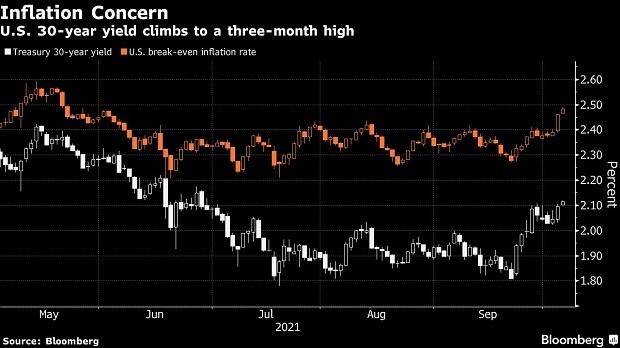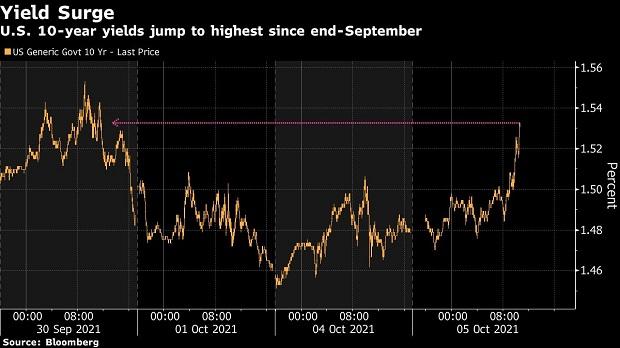US 30-year yield rises to highest since June as inflation fear grows
[ad_1]
Treasury 30-year yields climbed to the highest level since June as rising energy prices stoke concern inflation will accelerate.
The benchmark 30-year yield jumped to 2.12% in early Tokyo trade, extending its advance from last month’s low of 1.81%. The break-even rate, a gauge of expectations of consumer prices derived from the difference in yield between Treasuries and inflation-linked securities, rose to 2.49%, the highest since May.
Bond yields have been rising around the world in recent weeks amid speculation resurgent energy prices will push up costs through the economy just as central banks unwind debt purchases as they more toward normalizing their monetary policies.

The recent market move has been drive more by break-evens than by expectations of Federal Reserve policy, said Priya Misra, global head of rates strategy at TD Securities in New York. “The energy crisis is being priced into the rates curve.”
The benchmark 10-year yield rose two basis points Wednesday to 1.55%, a third day of gains. It has climbed more than 20 basis points since the end of August.
It’s a tricky moment for bond investors. While the relation theme was dominant earlier in the year, it began to fade in the middle of May when Fed officials started openly debating trimming back asset purchases, a precursor to raising interest rates. While U.s. consumer price inflation has slowed from its June peak, sudden shortages of some forms of energy are raising the prospect of a rebound.

The Bloomberg Commodity Spot Index, which tracks futures contracts for 23 raw materials, rose to a record on Tuesday, having gained more than 30% this year
The latest move in Treasuries was also driven by an unexpected increase in the September ISM Services Index, published Tuesday. September payroll data due Friday may seal the deal for the Fed to announce tapering of asset purchases in November, Fed Chair Jerome Powell said after last month’s meeting.
“Tapering of QE seems like a done deal for the November meeting,” said Thomas Simons, senior money markets economist at Jefferies LLC in New York. “It depends on the quality of the employment data in September, but Powell has set the bar very low in terms of what he needs to see to move forward.”
New Zealand’s central bank raised interest rates on Wednesday for the first time in seven years and indicated further increases will likely be needed to tame inflation. The move was anticipated by all but one of the 21 economists surveyed by Bloomberg.
–With assistance from Brody Ford.
 Dear Reader,
Dear Reader,
Business Standard has always strived hard to provide up-to-date information and commentary on developments that are of interest to you and have wider political and economic implications for the country and the world. Your encouragement and constant feedback on how to improve our offering have only made our resolve and commitment to these ideals stronger. Even during these difficult times arising out of Covid-19, we continue to remain committed to keeping you informed and updated with credible news, authoritative views and incisive commentary on topical issues of relevance.
We, however, have a request.
As we battle the economic impact of the pandemic, we need your support even more, so that we can continue to offer you more quality content. Our subscription model has seen an encouraging response from many of you, who have subscribed to our online content. More subscription to our online content can only help us achieve the goals of offering you even better and more relevant content. We believe in free, fair and credible journalism. Your support through more subscriptions can help us practise the journalism to which we are committed.
Support quality journalism and subscribe to Business Standard.
Digital Editor
[ad_2]
Source link






